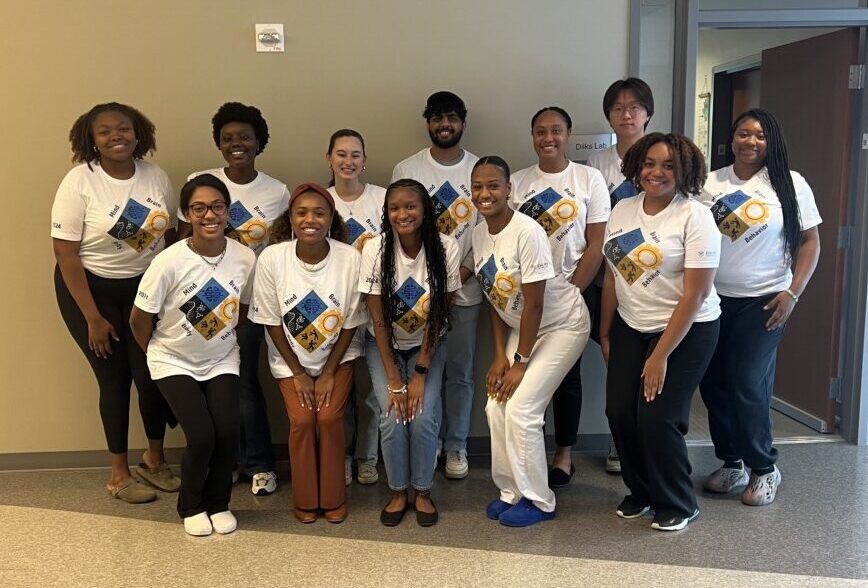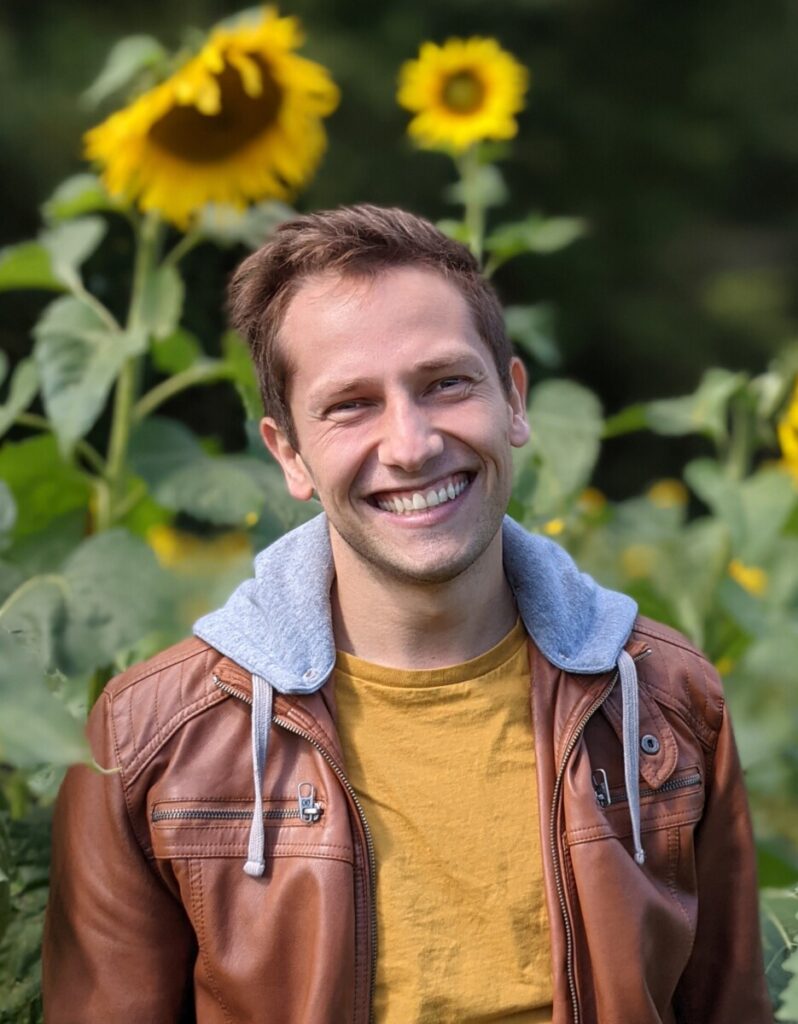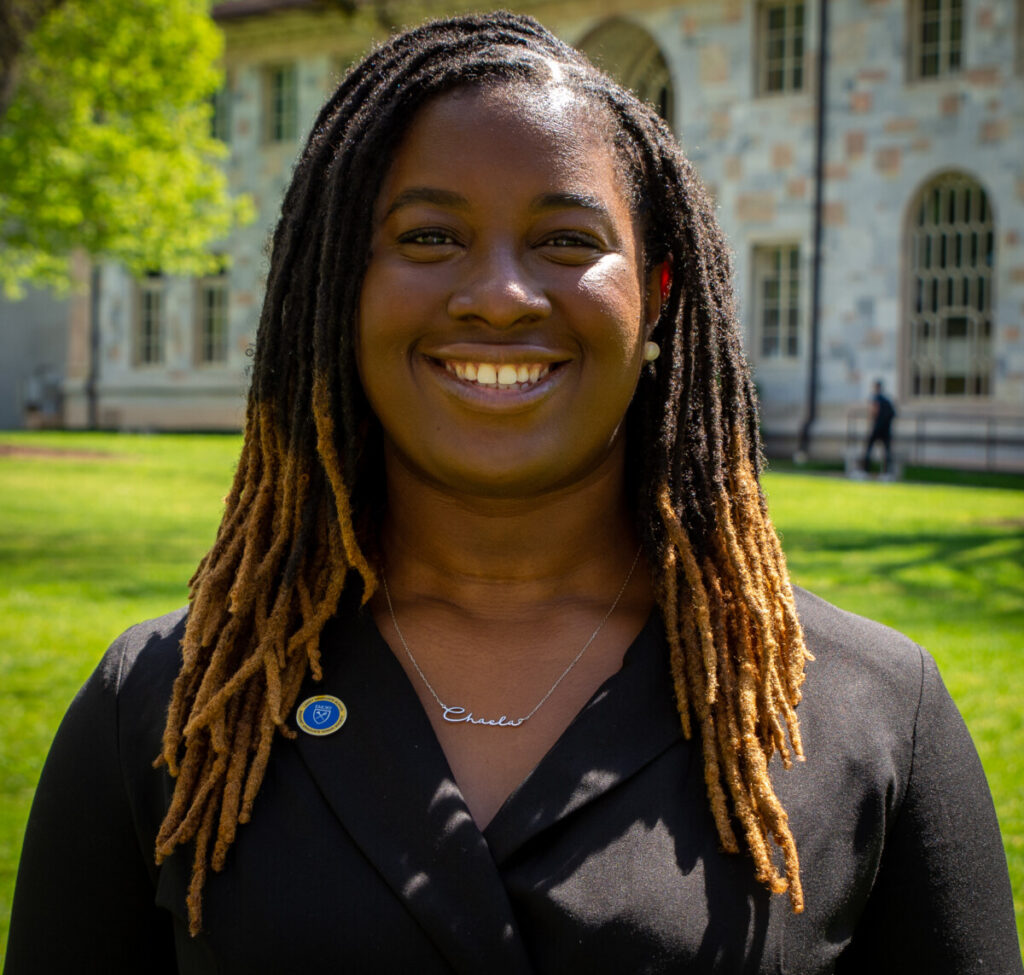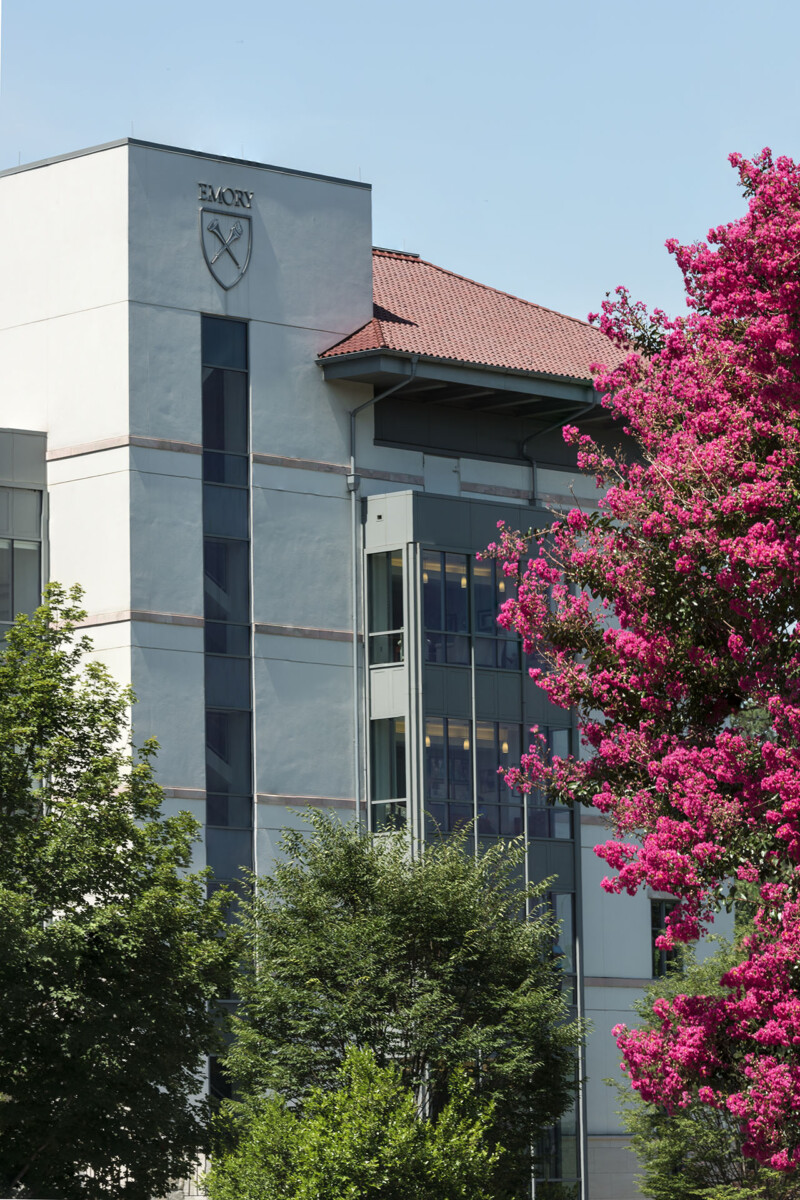









































Abby Larson is a sophomore at Gettysburg College double majoring in Psychology and Sociology. Once Abby graduates she plans to apply for a clinical psychology Ph.D. program. She hopes to conduct eating disorder research and develop preventative treatments. In Abby’s free time, she conducts psychology research with a professor, works in a local coffee shop, and is an active member of her sorority (AOII).
Mentor: Dr. Benjamin Wilson

Alixandra Green is a junior at Hampton University studying Psychology and Criminal Justice. Alixandra has an interest in exploring the intersections of psychology specifically criminology, social justice, and public policy to gain a holistic understanding of human behavior and its implication on society. Alixandra’s interest in True Crime is part of why she wants to go into a career in Forensic Psychology. Alixandra has a love for dogs and in her free time, she volunteers at a dog shelter.
Mentor: Dr. Aubrey Kelly

Amirah Mckinley is a rising senior Psychology major from Evanston Illinois attending Spelman College. She is interested in Neuropsychology and looking at the relationship between the brain and behavior. More specifically she has an interest in neurodevelopmental disorders and neurodegenerative diseases. Upon graduating from Spelman, she plans to obtain a Ph.D. in Neuropsychology and become a Pediatric Neuropsychologist or a Forensic Neuropsychologist. In her free time, she enjoys painting, reading, spending time in nature and with family.
Mentor: Dr. Joseph Manns

Gabriella Lee is a junior at Spelman College with a major in Psychology and a minor in Management and Organization. Gabriella has an interest in understanding the interface between mental health and the juvenile legal system. Gabriella has a deep aspiration to become a Behavioral Analyst. In Gabriella’s free time, she loves to travel and binge-watch shows like “Law and Order”, “Lock Up” and other forensic and crime-related shows.
Mentor: Dr. Rohan Palmer

Jordan Lockwood is a third-year Psychology major with an Entrepreneurship minor at Hampton University. Jordan has a nonprofit (The Happy Project) where she is trying to change the negative stigma of mental health while also giving back to the community through service and wellness. Jordan’s goal is to pursue a Ph.D. in community or clinical psychology and conduct research focusing on childhood trauma and development, specifically within the Black community. During Jordan’s free time, she does art therapy workshops, Zumba classes, and meditation/yoga sessions
Mentor: Dr. Rohan Palmer

Kevin Zheng is a sophomore at the College of William and Mary studying Psychology with a minor in Global Education. Kevin has an interest in understanding the interplay between socioeconomic disadvantage and psychopathology in children. Kevin also has an interest in intergenerational effects, risk and protective factors, and the nuances of stress and emotion regulation. Kevin loves to cook and listen to music
Mentor: Dr. James Rilling

MaKayla Ojeah is a junior Psychology major attending Spellman College. MaKayla has an interest in understanding the psychological support of human behavior. MaKayla would like to have a career as an Industrial and Organizational Psychologist. At the age of 17, MaKayla started her own business and has been in a movie.
Mentor: Dr. Brianna Yamasaki

Naomi Mwangi is a third-year, first-generation student majoring in Psychology at the University of Massachusetts Dartmouth. Naomi has an interest in conducting research that focuses on mental health in minority groups. Naomi wants to become a Clinical Psychologist. Naomi swam in 3 out of the 5 “oceans” in the world and her favorite thing to do is read.
Mentor: Dr. Patricia Brennan

Pahul Dhoat is a junior Psychology major that attends Cal Poly SLO. Pahul has an interest in psychology research, specifically in cognition. Pahul would like to combine his interest in Medicine and Psychology/Neuroscience with an MD/Ph.D. In Pahul’s free time, he loves to play football and volleyball.
Mentor: Dr. Peter Hitchcock

Zoe McNeil is a junior at Tuskegee University studying Psychology with a minor in Bioethics. Zoe is interested in both research and clinical aspects of psychology. Zoe goal is to work with communities of color that are impacted by intergenerational trauma. Zoe has a passion for ADHD, anxiety, and the misdiagnosis of ODD in black youth. Mental health and illness and its impact on marginalized people is very fascinating and important to Zoe. After graduating Zoe wants to pursue a PhD in Clinical Psychology.
Mentor: Dr. Ali Cohen

Bria Slade is a third-year student at North Carolina A&T State University studying psychology. Bria has an interest in neuroscience, as well as psychophysiological and health disparity research among marginalized groups. She loves to go to concerts and read in her free time. Upon graduation, Bria plans to pursue her PhD in the field of Neuroscience.
Mentor: Ali Cohen

Iyanna Kennedy is a rising senior psychology major and digital photography minor from Houston, Texas, attending Spelman College. Iyanna is interested in developmental psychology, specifically examining mental health disorders within marginalized groups. She plans to obtain a Ph.D. in developmental or industrial and organizational psychology upon graduating from Spelman College. In Iyanna’s free time, she loves to create content on TikTok and YouTube, documenting her life as a Spelman College student.
Mentor: Dr. Patricia Brennan

Benetta Wang is a junior at William & Mary majoring in Psychology and minoring in Public Health. She is interested in developmental psychopathology and understanding how early life stress affects child development and negative developmental outcomes. Benetta hopes to develop a career in Clinical Psychology. In her free time, she enjoys reading, cooking, and crocheting.
Mentor: James Rilling

Cornesia Graham is a senior majoring in Psychology at Chicago State University. Driven by a passion for mental health and a commitment to research and teaching, Cornesia aspires to pursue a Ph.D. in Clinical Psychology, focusing on the impact of mental health and intergenerational trauma across all age groups within minority communities. She is dedicated to
fostering Community and creating safe, healing spaces whenever possible. Outside of academics, Cornesia enjoys gardening, spending time with loved ones, and engaging in movement through yoga.
Mentor: Dr. Rohan Palmer

Isabella Wynter Mitchell is a rising senior at Central State University majoring in Psychology and minoring in Computer Science. She is interested in language, specifically examining the cognitive effects of bilingualism. After graduation, Isabella plans to get her doctorate to develop culturally inclusive assessment practices for bilingual students. In her free time, she enjoys arts and crafts, and the company of a good book.
Mentor: Dr. Brianna Yamasaki

Camryn Williams is a rising junior at Spelman College, majoring in Psychology. Originally from Atlanta, Georgia, she is interested in Neuropsychology, particularly in the areas of memory retention and the factors that enhance retrieval practice. Through her research, she hopes to uncover more effective strategies for educating future generations. After graduating from Spelman, she plans to pursue a Ph.D. in Neuropsychology, with the goal of becoming a researcher and practicing outside of the United States. In her spare time, she enjoys crafting, dancing, and spending quality time with friends and family.
Mentor: Joseph Manns
Mentors for REU: MB3 are aligned with at least one of research areas (Cognitive & Computational Science [CCS], Clinical Science [CS], Behavioral & Systems Neuroscience [BSN], Developmental Science [DS]) and include:
FACULTY
Rohan Palmer (MB3 Director; Research Areas: BSN, CCS, CS) is a behavioral geneticist who studies genetic and environmental mediation of drug effects on the human brain and behavior using multi-omic and cross-species methods. Students that are matched to PI Palmer will conduct research in the Behavioral Genetics of Addiction Laboratory. Students in the PIs lab can partake in a variety of projects, such as consilience research on how genes expressed in a mouse model of binge drinking recapitulates protein expression in the brains of human alcoholics. Similarly, a student could spend their summer studying how genetic effects of conscientiousness, a personality trait, are associated with cannabis use. Research in the Behavioral Genetics of Addiction lab will lead to knowledge in core areas: Big Data analysis, imputation of genetic data, genome-wide association studies, polygenic risk scores, and twin models.
Dr. Patricia Brennan (CS, DS) employs longitudinal and biosocial research methods to examine developmental psychopathology. One of her primary research foci is the examination of stress and its impacts on children from prenatal phases of development onward. Her current research examines biological mechanisms—including the composition of the microbiome, immune functioning, and disruptions of the hypothalamic-pituitary-adrenal (HPA) axis—linking prenatal exposures to child cognitive and behavioral outcomes. Her currently funded projects examine intergenerational risk for psychopathology in African American families. Students working in her lab will have the opportunity to participate in ongoing longitudinal studies which involve outreach to African American families, neurodevelopmental testing, biospecimen collection, and offline behavioral coding of maternal and child behaviors. Students will develop knowledge in core areas of longitudinal cohort research, biosocial theories of development, and interdisciplinary science.
Dr. Vanessa Brown (CSS, CS) is a clinical psychologist and cognitive computational neuroscientist who studies learning dysfunctions in anxiety and related disorders. Current studies in the Computational Modeling of Psychopathology (COMP) Lab use functional and structural MRI, behavioral paradigms, computational modeling, clinical assessment, psychophysiology, and ecological momentary assessment to understand uncertainty learning and avoidance behavior in anxiety. REU students have the opportunity to work with any of these data based on their interests. Students will gain experience in learning theory, cognitive neuroscience, computational modeling, and clinical assessment of internalizing disorders.
Dr. Alexandra Cohen (CCS) is a developmental cognitive neuroscientist and directs the Learning, Memory, Understanding, & Neurodevelopment (LUMeN) Lab at Emory. Research in the LUMeN lab aims to shed light on how motivation and emotion influence learning, memory, and brain function across development. This work may ultimately inform strategies that leverage adaptive developmental changes in motivated learning and memory mechanisms to improve learning, decision-making, and outcomes for young people. Research assistants play a crucial role in all stages of the research process. Responsibilities may include recruiting and testing study participants (children, adolescents, and adults), helping prepare experimental stimuli or scripts, and helping to analyze and interpret the data that are collected. Research assistants are expected to engage intellectually with the research and to work on gaining an array of skills (e.g., working with human participants, coding, computational modeling, analyzing behavioral and neuroimaging data, reading and thinking about scientific literature, etc.).
Dr. Robert Hampton (BSN, CCS, DS) is the director of the Laboratory of Comparative Primate Cognition that conducts comparative studies of memory and cognition that inform our understanding of cognitive evolution in primates and birds. Students will help others with their ongoing projects on learning and memory in monkeys using computerized operant training techniques. Students are responsible for programming experiments and participating in the daily training of monkeys and for the collection of data, with supervision from the PI and/or lab staff. Students are guided in the analysis of the data and summarize their findings in a scientific format paper. Students will develop knowledge in core areas of memory and cognition, computer programming, experimental design, data analysis, and scientific writing.
Dr. Peter Hitchcock (CS, CCS) directs the Translational Lab, which focuses on how learning and decision-making goes awry in depression and anxiety disorders and on developing powerful translational interventions. A mainstay of the lab’s research is carefully designed behavioral tasks conducted online or in the laboratory. The data from these tasks are analyzed via computational models. These models allow us to dissect learning and decision-making into their constituent components. Such dissection, in turn, may help us to pinpoint what goes amiss in psychiatric disorders. It may also help us to optimize learning and decision-making in psychological treatments—thereby making these interventions more potent and enabling them to reach more people. Research in the Translation Lab will lead to knowledge in core areas of experimental design, computational modeling, and the learning and behavioral foundations of psychotherapy,
Dr. Aubrey Kelly (BSN, DS) is a behavioral neuroscientist who studies the evolution of the mechanisms underlying social behavior. Research in the Kelly Lab aims to elucidate the mechanisms underlying variation in animal behavior, with a particular emphasis on examining the role of the nonapeptides, vasopressin, and oxytocin, in social behavior. Students visiting the lab will obtain training in conducting behavioral studies on 2 species of rodents (Mongolian gerbils and African spiny mice) to gain experience using a comparative approach to studying behavior. They may participate in projects mapping neural circuits underlying prosocial behavior in adults or projects examining the development of the social brain. Students will develop knowledge in core areas of behavioral ecology, neuroendocrinology, and systems neuroscience to study neural mechanisms underlying behavior.
Dr. Joseph Manns (Research Mentor: CCS, BSN) studies memory in humans and rats, though summer opportunities for students would focus on our research with human participants. In particular, we study the type of everyday memory for facts and events that is often called declarative memory. Our recent research with humans has explored why a memory test is often a great way to strengthen subsequent retention of the tested information, a phenomenon called the testing effect or the retrieval practice effect. An example would be quizzing oneself rather than rereading course material in preparation for a final exam. Typically, quizzing oneself leads to better final exam performance. Our recent and ongoing experiments have tried to understand better the cognitive processes behind this phenomenon. Summer students will have opportunities to gain knowledge in the science of memory and to gain exposure to hypothesis generation, experimental design, data analysis, hypothesis testing, and science communication.
James Rilling (CS) uses non-invasive functional brain imaging techniques to investigate the neural bases of human social cognition and behavior, with a current focus on caregiving in fathers, grandmothers and dementia caregivers. Much of his research is examining the role of oxytocin signaling in human social cognition and behavior.
Dr. Hillary Rodman (BSN, DS) studies the development, plasticity, and evolution of brain systems, particularly but not exclusively the visual system. Students have the opportunity to study structural and neurochemical changes in the diverse regions and neuronal cell populations affected by early-life challenges imposed by both direct brain damage and environmental alterations. One focus in the lab is the reorganization of the brain after early-life damage to the primary visual cortex or the hippocampus. Another focus is the interaction between lighting, activity pattern, and visual/ affective behavior. These studies are pertinent to current concerns about the effects of mistimed and extended exposure to light on circadian rhythms, cognition, and mood, especially during development. Research in the Rodman lab will lead to knowledge in core areas of neuroanatomy, design of studies of brain-behavior relationships, immunohistochemistry, light microscopy, and analysis of anatomical and behavioral data.
Dr. Michael Treadway (BSN, CCS, CS) studies the pathophysiology of impaired motivation and decision-making in humans. The focus of Dr. Treadway’s research program is to advance our understanding of the neural circuitry underlying motivation and effort-based decision-making, and how alterations in these circuits may give rise to the maladaptive choices commonly found among individuals experiencing symptoms of avolition, apathy, and anhedonia. Primary research activities emanating from this overarching goal include three core areas: i) characterizing motivational and decision-making deficits in clinical populations, ii) elucidating the neurobiology of motivation, reinforcement learning, and decision-making, and iii) testing the validity of a possible transdiagnostic ‘inflammatory sub-type’ for motivational impairments that may arise from abnormal brain-immune interactions. Students will contribute to this research through data collection of laboratory-based and online behavioral studies of decision-making, assisting with fMRI scans, data cleaning, and data analysis.
Dr. Irwin Waldman (CS, DS) is a behavioral geneticist who studies developmental psychopathology and developmental genetics. Dr. Waldman’s research aims to understand the causes, classification, and development of childhood disruptive disorders and externalizing behavior problems, as well as related personality and temperament traits, social cognitive mechanisms, and neurocognitive executive functions. For example, students might work on a project examining the covariation of childhood externalizing and internalizing disorders, and the covariation of these disorders with temperament and personality traits or a genome-wide association studies of ADHD, Conduct Disorder, aggression, and psychopathic traits. Research in the Waldman lab will lead to knowledge in core areas: developmental psychopathology, imputation, genome-wide and candidate gene studies, and twin models.
Dr. Benjamin Wilson (BSN) is a comparative neuroscientist who studies cognitive abilities and neural systems that support language learning and communication, in both nonhuman and human primates. In the lab, students will have the opportunity to work on projects assessing statistical and implicit learning in both human participants and Rhesus macaque monkeys. Students may work with groups with language difficulties (e.g., dyslexia, developmental language disorder). Students may also take the opportunity to be involved in neuroimaging (i.e., fMRI) experiments. While some aspects of this work will require close supervision (animal work, neuroimaging), other areas can be undertaken more independently, providing the students both with unique research experience as well as an opportunity to develop their independence. Students will develop knowledge in core areas of: language, learning, and cognition; primate models; neuroimaging; experimental design, and data analysis.
Dr. Brianna L. Yamasaki is a cognitive and developmental neuroscientist who studies how one’s external environment and experiences and internal cognitive and biological factors drive individual differences in language and reading development. Most of our work focuses on populations for which language and reading development may be challenging. For example, for linguistically diverse individuals (e.g., bilinguals) and for individuals with learning and developmental disabilities. In the Brain, Behavior, and Broader Learning (BaBL) lab, students will have the opportunity to work on projects investigating questions like: (1) what predicts successful English reading development in young children entering the US school system as English learners (i.e., those not yet proficient in English) and how does the brain changes over the course of that kindergarten year to support reading development and (2) how does bilingual language experience influence cognitive and linguistic development in those with autism, from both a behavioral and neural perspective. Research in BaBL lab will lead to knowledge in core areas of language, literacy, and cognitive development and behavioral- and neuroimaging-based experimental design and analysis.
GRADUATE STUDENTS

Ms. Imani Bunn is a second year student in the Neuroscience & Animal Behavior Doctoral Program. Imani’s research is being conducted in the laboratory of Prof. Joseph Manns. Ms. Bunn will be teaching the 2024 spring workshop of REU-MB3.

Ms. Jocelyn Stanfield is a second year student in the Clinical Psychology Doctoral Program. Jocelyn conducts her research in the laboratory of Prof. Patricia Brennan. Ms. Stanfield will be a part of REU-MB3’s graduate student mentor team in summer of 2024.

Mr. Ryno Kruger is a fourth-year Ph.D. candidate in the Developmental Psychology Doctoral Program. Ryno is conducting research on social cognition using visual perception across development. His research is being conducted in the laboratory of Dr. Stella Lourenco. Mr. Kruger will be a part of REU-MB3’s graduate student mentor team in the summer of 2024

Ms.Chaela Nutor is a fifth year Psychology PhD Candidate at Emory University working with Dr. Patricia Brennan. With her research, she aims to better understand the environmental risk factors that lead to disparities in child development. She is particularly interested in exploring the role of race, socioeconomic status, and exposure to environmental toxicants in the earliest stages of the neurodevelopment. Chaela has been very active within her program, providing mentorship and therapy to children along with her clinical research. She is also a fellow in Emory’s Diversifying Graduate Education (EDGE), where she helps program events & program recruitments. Ms. Nutor will be teaching the 2024 Fall workshop and graduate mentor in Summer of 2025.

Mrs. Colette Delawalla is a Clinical Science PhD student and is working to translate findings from pre-clinical work on compulsive alcohol use to an empirically derived model of compulsive use in humans. Mrs. Delawalla will be teaching the 2025 Summer workshop.

Ms. Sarah Etuk is a 6th yr. Clinical Psychology graduate student with an interest in how experiences of stress get under the skin and contribute to the development of depressive symptoms. Her current research focuses on associations between a derivative of dopamine, stress, and objective and subjective measures of motivation. Her hope is to provide new insight into the biological processes underlying depression and its related symptoms. Ms. Etuk will be teaching the 2025 Fall workshop.

REU Site: Mind, Brain, Body, and Behavior (MB3) provides research opportunities during its summer session thanks to mentors across each of the graduate research concentrations at Emory Psychology.
Concentrations focus on biological mechanisms and include:
Behavioral & Systems Neuroscience: Focuses on studies of neural systems using electrophysiology, fMRI, and neuroanatomical approaches, field and laboratory studies of behavior, cognition and memory, exploring the information conveyed by nonlinguistic communication signals, and quantification of gene expression following different behavior.
Clinical Science: Focuses on biological, cognitive, affective and social processes that are associated with risk and intervention for psychopathology.
Cognitive & Computational Science: Focuses on the processes that underlie human perception, learning, memory, emotion, conceptual representation, and language.
Developmental Science: Focuses on understanding the origins and development of the human mind and brain by investigating the ontogenetic and phylogenetic underpinnings of social and cognitive processes, as well as the development and learning that accompany these processes.
MB3 participants will get to know the faculty and their research during the spring online workshop. Afterwards they will be matched with a faculty research mentor for their summer in-person research.